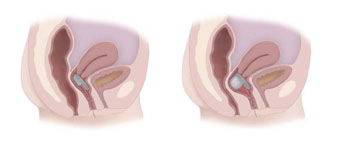Vaginal Insert Offers Alternative Treatment for Fecal Incontinence 
|
By HospiMedica International staff writers Posted on 02 Feb 2016 |

Image: The Eclipse vaginal insert in deflated (L) and Inflated (R) states (Phoyo courtesy of Pelvalon).
A novel vaginal insert for bowel control eliminates the need for surgery or an in-office procedure for the treatment of female fecal incontinence (FI).
The second-generation Eclipse System is comprised of a vaginal insert in the form of an inflatable balloon that is placed in the same location as a tampon or a diaphragm. The insert is composed of a base portion, an inflatable balloon portion, an inflation tube, and a self-closing Luer valve connection. The base portion positions the balloon and helps maintain the placement of the insert in the vagina. The balloon itself is made of thin walled silicone, with an enclosed, non-body contacting polyurethane liner to minimize air loss. The silicone inflation tube terminates in the self-closing Luer valve that connects to the patient pump.
The pump itself is fitted with a removable regulating valve that controls the amount of air introduced to the inflatable balloon. During inflation, the pump is squeezed seven to ten times to adequately fill the balloon, with any excess air vented out by the regulator. When inflated, the balloon exerts pressure through the vaginal wall, occluding the rectal area and providing immediate bowel control. The patient can inflate and deflate the device at home when needed, thus reducing the number of FI episodes and protecting from unwanted stool passage. The device is removed periodically for cleaning.
The insert is initially fitted using a sizing tool to assist with customizing insert size, and is inflated to the correct volume by a clinician to determine the correct regulator valve. A trial insert is available to allow patients to evaluate the therapy before deciding whether it works for them. The system is available in three base sizes and two balloon sizes, and is intended for women 18–75 years old who have had four or more FI episodes during a two-week period. The Eclipse System is a product of Pelvalon (Sunnyvale, CA, USA), and has been approved by the US Food and Drug Administration (FDA).
“With this FDA clearance for our next-generation Eclipse, we are excited to initiate the first phase of our commercial launch in select centers of excellence,” said Miles Rosen, CEO and co-founder of Pelvalon. “We believe that this early phase of partnership with thought and practice leaders in the field of pelvic floor disorders will ensure a smooth expansion down the road.”
“Eclipse is a nonsurgical therapy offering immediate bowel control that can be used early in the treatment pathway,” said Holly Richter, MD, director of the division of urogynecology and pelvic reconstructive surgery at the University of Alabama (Birmingham, USA). “Like the first-generation device, the next-generation Eclipse is an easily tried approach that fills a gap between lifestyle changes in diet and exercise and more invasive treatments. I'm excited that this new option will soon be available to my patients.”
FI is the inability to control bowel movements and is a common problem, especially among older adults. It affects women about twice as often as men, most probably due to childbirth, nerve or muscle damage in the pelvic region, or gastrointestinal disorders such as irritable bowel syndrome (IBS). First-line treatments include dietary changes, exercise, and medication; if the issue persists, patients may need to move on to more invasive and costly treatments, such as surgery, surgical implants, or injections.
Related Links:
Pelvalon
The second-generation Eclipse System is comprised of a vaginal insert in the form of an inflatable balloon that is placed in the same location as a tampon or a diaphragm. The insert is composed of a base portion, an inflatable balloon portion, an inflation tube, and a self-closing Luer valve connection. The base portion positions the balloon and helps maintain the placement of the insert in the vagina. The balloon itself is made of thin walled silicone, with an enclosed, non-body contacting polyurethane liner to minimize air loss. The silicone inflation tube terminates in the self-closing Luer valve that connects to the patient pump.
The pump itself is fitted with a removable regulating valve that controls the amount of air introduced to the inflatable balloon. During inflation, the pump is squeezed seven to ten times to adequately fill the balloon, with any excess air vented out by the regulator. When inflated, the balloon exerts pressure through the vaginal wall, occluding the rectal area and providing immediate bowel control. The patient can inflate and deflate the device at home when needed, thus reducing the number of FI episodes and protecting from unwanted stool passage. The device is removed periodically for cleaning.
The insert is initially fitted using a sizing tool to assist with customizing insert size, and is inflated to the correct volume by a clinician to determine the correct regulator valve. A trial insert is available to allow patients to evaluate the therapy before deciding whether it works for them. The system is available in three base sizes and two balloon sizes, and is intended for women 18–75 years old who have had four or more FI episodes during a two-week period. The Eclipse System is a product of Pelvalon (Sunnyvale, CA, USA), and has been approved by the US Food and Drug Administration (FDA).
“With this FDA clearance for our next-generation Eclipse, we are excited to initiate the first phase of our commercial launch in select centers of excellence,” said Miles Rosen, CEO and co-founder of Pelvalon. “We believe that this early phase of partnership with thought and practice leaders in the field of pelvic floor disorders will ensure a smooth expansion down the road.”
“Eclipse is a nonsurgical therapy offering immediate bowel control that can be used early in the treatment pathway,” said Holly Richter, MD, director of the division of urogynecology and pelvic reconstructive surgery at the University of Alabama (Birmingham, USA). “Like the first-generation device, the next-generation Eclipse is an easily tried approach that fills a gap between lifestyle changes in diet and exercise and more invasive treatments. I'm excited that this new option will soon be available to my patients.”
FI is the inability to control bowel movements and is a common problem, especially among older adults. It affects women about twice as often as men, most probably due to childbirth, nerve or muscle damage in the pelvic region, or gastrointestinal disorders such as irritable bowel syndrome (IBS). First-line treatments include dietary changes, exercise, and medication; if the issue persists, patients may need to move on to more invasive and costly treatments, such as surgery, surgical implants, or injections.
Related Links:
Pelvalon
Latest Patient Care News
- Portable Biosensor Platform to Reduce Hospital-Acquired Infections
- First-Of-Its-Kind Portable Germicidal Light Technology Disinfects High-Touch Clinical Surfaces in Seconds
- Surgical Capacity Optimization Solution Helps Hospitals Boost OR Utilization

- Game-Changing Innovation in Surgical Instrument Sterilization Significantly Improves OR Throughput
- Next Gen ICU Bed to Help Address Complex Critical Care Needs
- Groundbreaking AI-Powered UV-C Disinfection Technology Redefines Infection Control Landscape
- Clean Hospitals Can Reduce Antibiotic Resistance, Save Lives
- Smart Hospital Beds Improve Accuracy of Medical Diagnosis
- New Fast Endoscope Drying System Improves Productivity and Traceability
- World’s First Automated Endoscope Cleaner Fights Antimicrobial Resistance
- Portable High-Capacity Digital Stretcher Scales Provide Precision Weighing for Patients in ER
- Portable Clinical Scale with Remote Indicator Allows for Flexible Patient Weighing Use
- Innovative and Highly Customizable Medical Carts Offer Unlimited Configuration Possibilities
- Biomolecular Wound Healing Film Adheres to Sensitive Tissue and Releases Active Ingredients
- Wearable Health Tech Could Measure Gases Released From Skin to Monitor Metabolic Diseases
- Wearable Cardioverter Defibrillator System Protects Patients at Risk of Sudden Cardiac Arrest
Channels
Critical Care
view channel
Ingestible Smart Capsule for Chemical Sensing in the Gut Moves Closer to Market
Intestinal gases are associated with several health conditions, including colon cancer, irritable bowel syndrome, and inflammatory bowel disease, and they have the potential to serve as crucial biomarkers... Read moreNovel Cannula Delivery System Enables Targeted Delivery of Imaging Agents and Drugs
Multiphoton microscopy has become an invaluable tool in neuroscience, allowing researchers to observe brain activity in real time with high-resolution imaging. A crucial aspect of many multiphoton microscopy... Read more
Novel Intrabronchial Method Delivers Cell Therapies in Critically Ill Patients on External Lung Support
Until now, administering cell therapies to patients on extracorporeal membrane oxygenation (ECMO)—a life-support system typically used for severe lung failure—has been nearly impossible.... Read moreSurgical Techniques
view channel
Pioneering Sutureless Coronary Bypass Technology to Eliminate Open-Chest Procedures
In patients with coronary artery disease, certain blood vessels may be narrowed or blocked, requiring a stent or a bypass (also known as diversion) to restore blood flow to the heart. Bypass surgeries... Read more
Intravascular Imaging for Guiding Stent Implantation Ensures Safer Stenting Procedures
Patients diagnosed with coronary artery disease, which is caused by plaque accumulation within the arteries leading to chest pain, shortness of breath, and potential heart attacks, frequently undergo percutaneous... Read more
World's First AI Surgical Guidance Platform Allows Surgeons to Measure Success in Real-Time
Surgeons have always faced challenges in measuring their progress toward surgical goals during procedures. Traditionally, obtaining measurements required stepping out of the sterile environment to perform... Read moreHealth IT
view channel
Printable Molecule-Selective Nanoparticles Enable Mass Production of Wearable Biosensors
The future of medicine is likely to focus on the personalization of healthcare—understanding exactly what an individual requires and delivering the appropriate combination of nutrients, metabolites, and... Read more
Smartwatches Could Detect Congestive Heart Failure
Diagnosing congestive heart failure (CHF) typically requires expensive and time-consuming imaging techniques like echocardiography, also known as cardiac ultrasound. Previously, detecting CHF by analyzing... Read moreBusiness
view channel
Expanded Collaboration to Transform OR Technology Through AI and Automation
The expansion of an existing collaboration between three leading companies aims to develop artificial intelligence (AI)-driven solutions for smart operating rooms with sophisticated monitoring and automation.... Read more

















